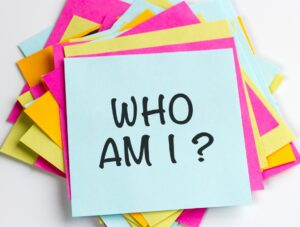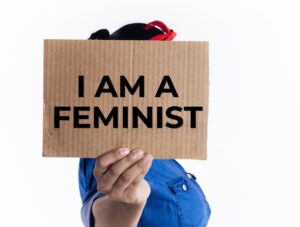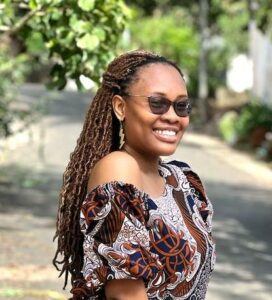In all our interconnected existence
In our struggles backed by persistence,
A life, a living thing
Sadly means nothing
Absolutely nothing….
Unless it is labelled.
“Is it not enough battle to be respected as a woman? Why do you want to be ‘labelled’ a feminist?
“Do you even know what ‘feminism means?”
“Why try to make yourself ‘unmarriageable’?”
“How do you feel forsaking your culture to embrace the foreign ideal?
Every day is a struggle. Every beautiful morning presents a new problem that threatens my very existence in very creative and unfounded ways. Every day: As a young person. A young woman. A young African woman. A young West African woman. A young West African feminist woman. Life is a struggle every day as a young, married West African Afrifeminist, advocate, and anti-imperialist woman.
However, my life hasn’t always been subjected to such scrutiny. I acknowledge that I belong to the minority of young girls who grew up in a household setting in Sierra Leone with minimal exposure to toxic masculinity. My home operated more on a matriarchal realm, where the only male presence was my father. Every other person under our roof was a woman. Household responsibilities were distributed based on capabilities and availability. Anyone present could readily take on household tasks, from unclogging a kitchen sink to freely expressing joy without judgment.
I could run around or watch cartoons on TV without the burden of societal expectations. There was no pressure on me to confine myself to the kitchen to learn how to cook or be told to rehearse being a dutiful wife. Our sole standard was the Bible, as we were raised in a Christian environment.

It was both terrifying and intriguing when I stumbled upon a music video one evening on our local broadcasting station. The lyrics urged parents to send their daughters to school, challenging the prevailing norm. Until that point, I was so sheltered that I couldn’t comprehend why parents would choose to keep their daughters at home for menial labour while sending their sons to school.
A few years later, the impact of that song lingered in my mind, coupled with the tumultuous teenage hormones. I felt hopeless when a classmate didn’t return to school after the Christmas holidays, having been married to a man her family chose. I pondered whether she would be allowed to resume her studies if she could care for her child if she became a mother and still enjoy simple things like leisure time with friends at the beach.
Then, I witnessed male teachers making inappropriate advances on classmates during my senior secondary school years and began understanding what power dynamics looked like even when you have no language for it. Faced with such situations, one typically had two choices: say yes and avoid victimisation in class, or say no and risk failing the class because age and gender intersect to give men power over young women. Few girls who faced harassment by these male teachers spoke up., I was angry, and this is how I discovered feminism.
But Patriarchy, adept at using shame as a weapon, was quick to label me a feminist.
During my university days as part of a planning community, after engaging in what I perceived as ‘friendly banter’ with colleagues, I was branded a feminist for having ‘nonconformist’ views. The term was thrown at me as if I were branded a ‘witch’ in the 1400s, a label that could have led to my persecution.
Confused and genuinely scared, I, a young woman striving to make friends and an omnivert, accepted the feminist label as an act of resistance. I wore it proudly, delving into research and joining progressive groups, proudly adding ‘feminist’ as a badge of honour to my name whenever possible.
For me, feminism became a sanctuary—a space offering full support to question oppressive systems, unlearn societal norms ingrained in my life, and challenge myself to not only know better but also live and act better. It became a realm where I realised my desire for girls to receive an education was not crazy. It was a space that acknowledged oppression as a meticulously constructed system affecting both women and men, yet conversations about it remained elusive.

Navigating this path was daunting for a young university student, a Christian, an African, and the only child of her parents. Could I still be a Proverbs 31 woman while condemning violence against women and girls? Could I assert that cooking is a life skill for all without facing rejection in my community? Could I pursue a relationship where my abilities and achievements wouldn’t threaten a partner, or would I be expected to abandon my dreams once married—assuming I ever get married?
Identifying as a feminist became a bold political statement—an additional layer to the multifaceted aspects of my identity: an African, a Sierra Leonean, an educated Sierra Leonean woman, a Christian, an omnivert, and a feminist. In a world governed by dominant and oppressive patriarchal structures, declaring oneself a feminist is crucial. It serves as a means for people to comprehend one’s politics or attempt to understand them. As the saying goes, “The personal is political.”
Though questions linger, one thing is certain: I proudly identify as an Afri-Feminist, enabling those who engage with me to automatically discern my stance and, ideally, gain some understanding of my politics.
 Suricia Yatiana Esther Conteh is an Afri-Feminist who deeply believes in knowledge sharing through storytelling and research. She loves watching cute videos of cats and reading books. Suricia hopes that all her efforts will contribute to a future where knowledge and information are equitably distributed to all.
Suricia Yatiana Esther Conteh is an Afri-Feminist who deeply believes in knowledge sharing through storytelling and research. She loves watching cute videos of cats and reading books. Suricia hopes that all her efforts will contribute to a future where knowledge and information are equitably distributed to all.
This story is part of a series in collaboration with the Yemoja Feminista Fellowship by CHEVS, a queer feminist organisation dedicated to advancing social justice and strengthening LGBTQI+ movements across West Africa. The series features insightful analyses, and fervent calls to action from young feminists addressing issues across gender, culture, and human rights in West Africa. The stories offer personal viewpoints on the struggles and victories of feminist activism in the region and the critiques of systemic injustices. The authors prompt us to face uncomfortable realities, question entrenched norms, and imagine a future where all people are free to live authentically and thrive.
Amidst growing complexities, regressive attitudes and laws targeting LGBTQIA+ rights, attacks on sexual and reproductive health rights by anti-gender networks, and the enduring impact of colonial legacies and harmful cultural practices, storytelling remains a vital tool. It challenges stereotypes, centers marginalized and minoritized voices, advocates for healing justice and collective care. In stories we honor the legacy of African feminisms and the tireless work to dismantle intersecting oppressive systems and create a vision of the future grounded in equity, justice, and love. – Rosebell Kagumire, Editor, African Feminism.
